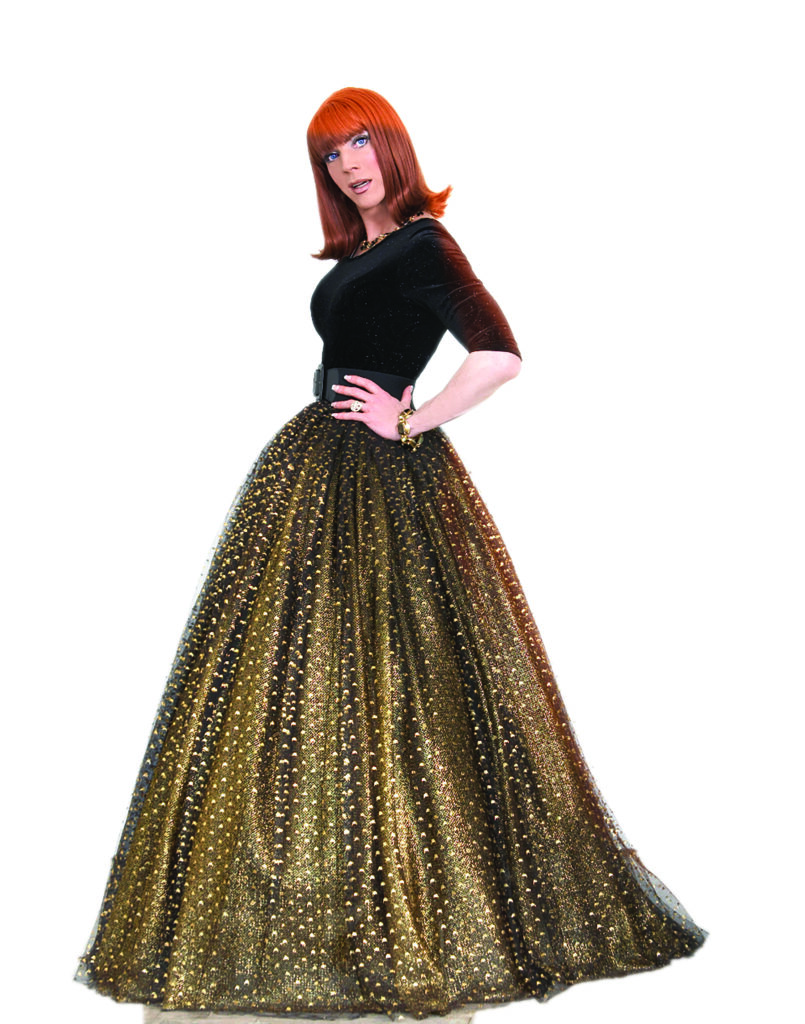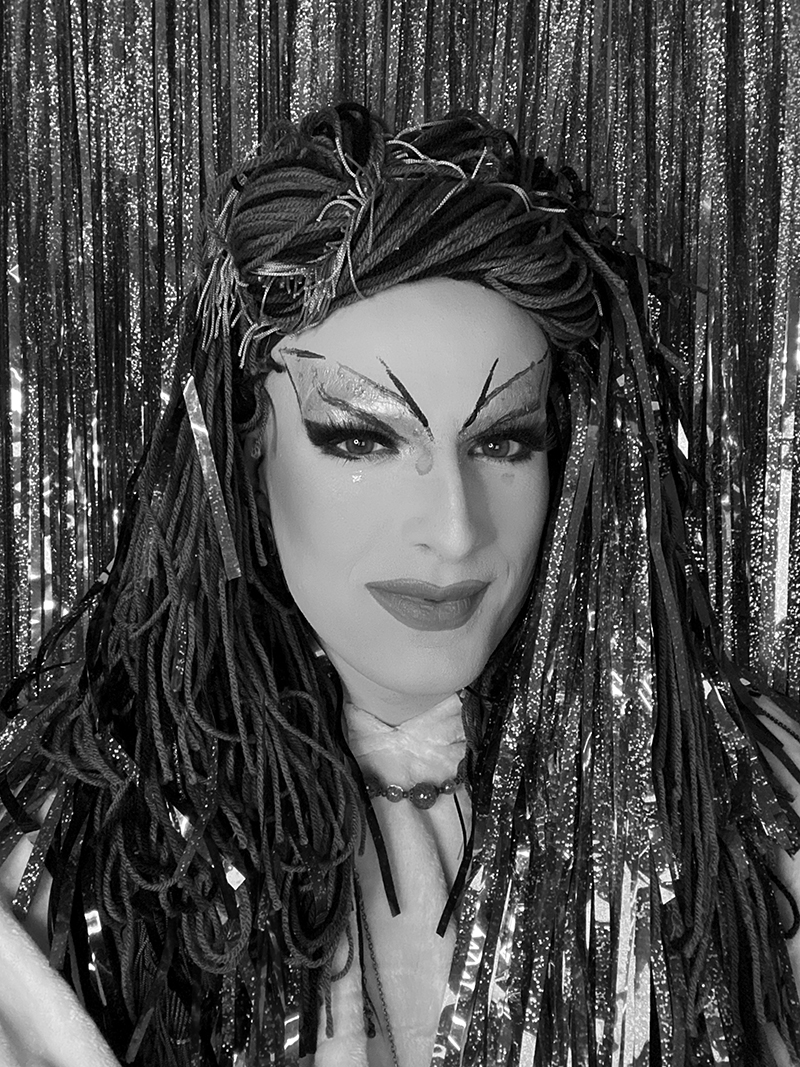story by Miss Mothie | photos by Peter Palladino
How does one begin to write about someone so writerly as Coco Peru?
If you are a long-time fan of Coco, you’ll get where she and I are coming from. If you are just meeting Coco, then allow me the honor of introducing her to the stage of your heart and imagination. And if you ARE Coco Peru, girl prepare to blush.
A theatrical child from the Bronx bloomed on the silver screen and became canonized through her wit and beauty into the super gay American imagination and heart. Through performances, appearances, activism, and literally the best YouTube channel ever,
Coco Peru has continued to shift the world and shift our perspectives on humor, love, and drag.
Her crafting of a show is keen. Meticulous. And to say the least, impressive. When booking a show she spends three months writing the script and practicing.
“People see my suitcase and see how organized I am. Or when I give my script to the tech person – and they’re like ‘Wait, you have a script?’ and then they realize Oh my god she’s got this down word for word. And the show is the same every single beat, boom boom boom.”
We were both out of drag for our meeting. She appeared tidy and together, though warmed by the California heat. I had a hickey on my neck and flour on my glasses from baking earlier. She was polite as to not mention either. [We spoke over video call.]
Coco’s image was burned into the American imagination in movies such as To Wong Foo, Trick, and Girls Will Be Girls, but she was burned into my imagination as a young lonely gay kid. I was never exposed to much film growing up. YouTube was my comedic education instead. I can’t remember when I first came to know of Coco. It seems, in my memory, she was always there. This sarcastic comfort. Whether playing Grand Theft Auto 5 or perusing markets for panettone, Coco could be summoned to brighten any grim morning before a barista job or any night of finals.
When I asked her where her layered and complex sense of sarcasm comes from she said, “When you are younger and you are living outside that box – it’s terrifying, but then it also allows you to become the observer (and so I became this observer). I also grew up around a lot of funny people in my neighborhood. And my parents have a lot of funny friends that I used to imagine were celebrities because they reminded me of the people that I loved on television. So this sense of comedic timing was developed. But I was also deeply obsessed with Bea Arthur as a kid (and so there weren’t a lot of distractions in the 70’s; you were either playing outside or you were inside watching your favorite TV shows). With Bea Arthur there was a wit and honestly it was a craft that these people had worked years on. So I was absorbing their craft. And then developing through years in college and – even in high school – my craft.”
I’ve always identified with Coco. Until we spent some time together, I was never sure just how much so. She’s an independent and layered aspiration. Her talents for writing and delivering monologues aren’t paralleled by many. The sharp tongue and the sharp sense of goodness.
“I grew up on a small island in the Bronx, City Island, very nautical, lots of boats, everybody knew each other’s business, working class neighborhood – Dad worked as a truck driver and mom worked when we needed money. And so it was simple, but we got by. But struggled. Had some privileges as well. But being gay in that kinda neighborhood at that time which I was born in – ‘65 so we’re talking about the first 10 years of my life – it was not easy being an effiminate little boy. And even though I wore boy clothes and had a short haircut, I was mistaken for being a girl all the time.”
Even early in life, people could sense the glitter in Coco’s spirit. She continued, “The bullying was devastating for me. Early on I had a sense that I was very special. My ‘otherness’ made me feel very special. I knew I was different from other kids and I was happy about it. And then as I realized that difference, that otherness, was going to make my life miserable and it was a bad thing, – it was devastating.”
That specialness is something many of us across the queer diaspora can connect with. To grow up feeling freaky and somehow transmute that feeling into art and success.
But there is much more to Coco. A sense of warmth cultivated through her image and audience. Though oft perturbed as a character, there is a lovingness that shines through Coco.
“When you walk out on stage and the spotlight hits you, you’ve entered this other realm of ‘you’re on the spot. You have to deliver.’ There’s no turning back. You’ve taken that leap of faith and so you have no other choice – there’s no choice now – you have to deliver. And lo and behold, you do. And that is how people should enter every day.”

I remarked about the peace of the stage, and the sometimes addictive natural of the spotlight, Coco said, “The space of the stage puts you in the moment. It’s how we’re supposed to live every day of our lives. In the present. That’s why it’s addictive and dangerous, too. Some people only feel alive when they’re on the stage; you’ve got to learn to bring some of that into your everyday life…That’s why sometimes I would go out in full drag – into the world. I would go food shopping in drag or do my chores, stop at the post office then I’ve gotta go here and I would do it in full drag because it keeps me very present. I’m aware of my surroundings, I’m just hyperaware. When people are reacting to you, you are hyperaware of yourself. And suddenly your average ordinary day of just doing chores becomes very magical. I love it.” Coco says, “I love it.” I catch a sly glint in her eyes. I can almost see all of those tiny stories she created in that look. All the people she’s talked to.
Coco says that some of the moments brought her into the creation of her stage act and persona, and while many moments are magical, others are born from discomfort and a feeling of being lost.
“There was so much rage in that room and infighting and government wasn’t doing anything, and as a young person who was just dealing with my sexuality and coming out – it was way too much for my brain to even be in that room. And I left so sad because I thought, I’m not big enough to take that on. But I thought, what do I do well? I’m really good at telling stories. And I’m really good at making people who don’t think they like me end up liking me just by being myself and telling my story.
“So I decided I’m going to own it. I’m going to do drag, gonna be totally honest, gonna tell autobiographical stories, and I’m gonna change the world by making the audience look at me and think they can’t relate to me because of the drag or whatever they perceive that to be and then by the end of the show they are gonna forget that it’s a man wearing a dress and they are going to be totally invested in my story. And that’s how you change people.”
I myself, have had similar experiences. I believe that sometimes drag can be a way for certain (ones) of us to express a second self that never got any love or attention or magic from the world previously. I felt very shaken by Coco’s story.
After that, the conversation meandered and became more intimate. Our mothers came up. Coco explained to me that her Mother had come into being a true ally, and at 94, remains a tremendous source of love and support.
“My mother had a pair of fuzzy slippers that I loved because they were like a shoe. And I used to love to sneak into my mother’s bedroom and put on her earrings and then shake my head so I could hear them make that noise – that clinking – and she had beautiful scarves and I used to take the scarves out and wrap them around my head or let them hang over my arms. I’d wear my favorite blanket or towel on my head with a baseball cap to hold it on so that I would have long ‘hair’. And I always made sure to take a mental photograph of her drawer. So I knew exactly where to put things back…
“What’s funny now is my mother is like ‘you like this ring, here take it.’ She’s my biggest fan! My mother always says, ‘I’m so lucky to have a gay child. Every parent should have a gay child,’ and by gay she means the whole rainbow.
One time I asked her, “why do you like gay people so much?” And she said, “Honey, they notice the details.”
And notice the details we do, Mamma Peru.
If you notice all the details of Coco Peru, a story unfolds.

“I told my Mother once, ‘I’m giving up Coco’ and she said ‘oh no no – you better be good to Coco because she’s been very good to you,” and I thought, you know that’s true. I need to start being better to Coco. And my husband tells me to remember why I created Coco in the first place. And as soon as I get back to the core of why I created this character, all the comparisons and show business, all of that stuff kinda disappears when I get back to why I’ve created Coco, which was to change the world.”
Amidst all of the writerly and actorly craft, and nuclear work ethic, there is something else. There is a cool girl who over and over and over has changed the world. From the monologue in Trick about eye irritation, to raising tremendous amounts of money through her activism as a friend to all.
“When I see someone like Lil Nas X being self-expressed starting with this brooding kind of performance style, and now he’s flaming it up and shaking his hips a bit more, it just lights my fire because this is everything that I’ve worked for. This kid being able to be himself. And the more people push back on him the more he shoves it in their face. That is drag!”
As an artist who has watched and listened to and emulated Coco at many a dinner table, I found myself starstruck during our time together. Her philosophical, sassy (and utterly dear) way of being goes far deeper than the flip and tone of her wig. A dazzling, irrepressible presence, there is something warm in Coco Peru’s eyes that never leaves. A kindness and sense of humanity that has inspired loyal fans the world over.
An American treasure and an inspiration. Shine on Miss Coco Peru!


